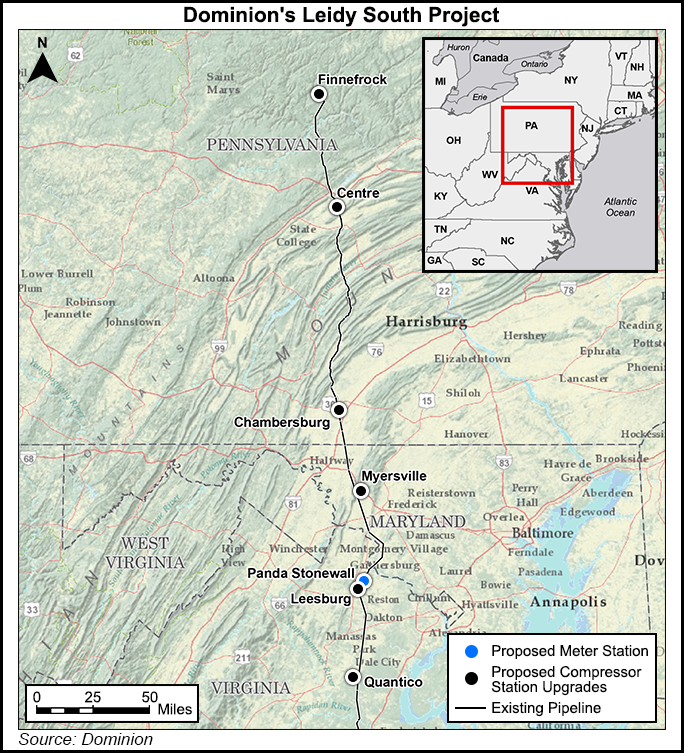Regulatory | Infrastructure | NGI All News Access | NGI The Weekly Gas Market Report
FERC OKs Dominion’s Leidy South Project
FERC has granted a certificate for Dominion Transmission Inc.’s (DTI) Leidy South Project, which would serve new and existing power generation facilities with natural gas traveling from the Leidy Interconnect in Clinton, PA, to points in Loudoun County, VA.

Panda Stonewall LLC, Virginia Power Services Energy Corp. Inc, and Mattawoman Energy LLC have signed binding agreements for all of the project capacity.
The project would involve modifications to six existing DTI compressor stations in Pennsylvania, Maryland and Virginia, and the construction of a metering and regulating station in Virginia. The estimated cost is $209.66 million [CP15-492]. The project received a favorable environmental assessment from Federal Energy Regulatory Commission staff earlier this year (see Daily GPI, March 31). DTI filed its application for the project last year (see Daily GPI, May 15, 2015).
The Commission said it received comments on the project from the Allegheny Defense Project; the Chesapeake Climate Action Network; the Virginia Department of Conservation and Recreation (Network); Loudoun County, VA; and the Virginia Department of Game and Inland Fisheries.
Allegheny commented on the direct, indirect, and cumulative effects of the Leidy South Project; upstream natural gas production in the Marcellus and Utica shales; segmentation of connected, cumulative, and similar actions; and the need for a programmatic environmental impact statement (EIS) for natural gas infrastructure projects. The Chesapeake Climate Action Network urged the Commission to consider the project’s effects on climate change. Virginia DCR filed comments on natural heritage resources near the project facilities, and Virginia Department of Game and Inland Fisheries commented on wildlife, habitat, and stormwater controls. Loudoun County filed comments on groundwater, noise, and public safety.
“We have explained in the past that there is no Commission plan, policy, or program for the development of natural gas infrastructure,” FERC said in its order. “Rather, the Commission acts on individual applications filed by entities proposing to construct interstate natural gas pipelines.
“Under NGA section 7, the Commission is obligated to authorize a project if it finds that the construction and operation of the proposed facilities ‘is or will be required by the present or future public convenience and necessity.’ What is required by NEPA [the National Environmental Policy Act], and what the Commission provides, is a thorough examination of the potential impacts of specific projects. In the circumstances of the Commission’s actions, a broad, regional analysis would ‘be little more than a study…concerning estimates of potential development and attendant environmental consequences,’ which would not present ‘a credible forward look and would therefore not be a useful tool for basic program planning.’
“As to projects that have a clear physical, functional, and temporal nexus such that they are connected or cumulative actions, the Commission will prepare a multi-project environmental document.”
© 2024 Natural Gas Intelligence. All rights reserved.
ISSN © 1532-1231 | ISSN © 2577-9877 | ISSN © 1532-1266 |
